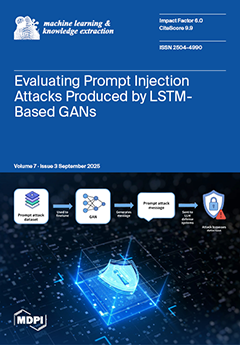Accurate and high-resolution spatio-temporal prediction of PM
2.5 concentrations remains a significant challenge for air pollution early warning and prevention. Advanced artificial intelligence (AI) technologies, however, offer promising solutions to this problem. A spatio-temporal prediction model is designed in this study, which is
[...] Read more.
Accurate and high-resolution spatio-temporal prediction of PM
2.5 concentrations remains a significant challenge for air pollution early warning and prevention. Advanced artificial intelligence (AI) technologies, however, offer promising solutions to this problem. A spatio-temporal prediction model is designed in this study, which is built upon a seq2seq architecture. This model employs an improved graph convolutional neural network to capture spatially dependent features, integrates time-series information through a gated recurrent unit, and incorporates an attention mechanism to achieve PM
2.5 concentration prediction. Benefiting from high-resolution satellite remote sensing data, the regional, multi-step and high-resolution prediction of PM
2.5 concentration in Beijing has been performed. To validate the model’s performance, ablation experiments are conducted, and the model is compared with other advanced prediction models. The experimental results show our proposed Spatio-Temporal Graph Convolutional Network with Attention Mechanism (STGCA) outperforms comparison models in multi-step forecasting, achieving root mean squared error (RMSE), mean absolute error (MAE) and mean absolute percentage error (MAPE) of 4.21, 3.11 and 11.41% for the first step, respectively. For subsequent steps, the model also shows significant improvements. For subsequent steps, the model also shows significant improvements, with RMSE, MAE and MAPE values of 5.08, 3.69 and 13.34% for the second step and 6.54, 4.61 and 16.62% for the third step, respectively. Additionally, STGCA achieves the index of agreement (IA) values of 0.98, 0.97 and 0.95, as well as Theil’s inequality coefficient (TIC) values of 0.06, 0.08 and 0.10 proving its superiority. These results demonstrate that the proposed model offers an efficient technical approach for smart air pollution forecasting and warning in the future.
Full article





